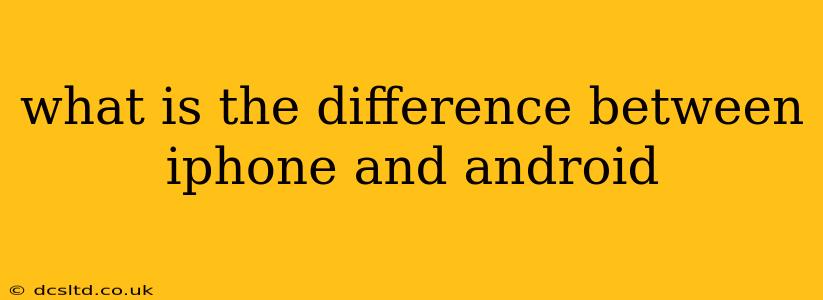The age-old question: iPhone or Android? Choosing between these two dominant mobile operating systems can feel overwhelming, given their similarities and differences. This comprehensive guide will dissect the key distinctions to help you make an informed decision. We'll cover everything from operating systems and app ecosystems to hardware and pricing, ensuring you understand the nuances beyond surface-level comparisons.
What is the Difference Between iOS and Android in Terms of Operating System?
At their core, iOS (Apple's operating system for iPhones) and Android (Google's open-source OS) differ significantly in their philosophies. iOS is known for its simplicity and user-friendliness, offering a tightly controlled environment with a consistent user experience across all Apple devices. Android, on the other hand, boasts greater customization options, allowing users to personalize their devices extensively. This flexibility extends to widgets, launchers, and even the overall look and feel of the interface. Android also runs on a vast array of hardware from different manufacturers, resulting in a broader range of device choices and price points.
How Do the App Ecosystems Differ Between iPhone and Android?
Both iOS and Android boast massive app stores – the App Store and Google Play Store, respectively. While both offer a vast library of apps, there are subtle but important differences. Generally, iOS apps are often considered to have a higher quality standard, benefiting from Apple's stricter app review process. Android's open nature means a wider range of apps are available, but the quality can be more inconsistent. Specific apps might launch on one platform before the other, though the major players are generally available on both.
Which Platform Offers Better Security Features?
Security is a paramount concern for smartphone users. Both iOS and Android employ robust security measures, but their approaches differ. iOS benefits from Apple's tightly controlled ecosystem, making it inherently more difficult for malware to infiltrate the system. Android's open nature, while offering customization benefits, also presents a larger attack surface, requiring users to be more diligent about app downloads and security updates. However, Google regularly updates its security features, making Android increasingly secure.
What About Hardware and Design Differences?
Apple designs its own hardware and software, resulting in a highly integrated experience. This synergy allows for optimized performance and seamless functionality between hardware and software components. Android devices, on the other hand, are manufactured by various companies (Samsung, Google, OnePlus, etc.), leading to a wider array of hardware choices, including screen sizes, camera capabilities, and processing power. This diversity presents both advantages (greater choice) and disadvantages (potential inconsistencies in quality and user experience).
Which Operating System Offers More Customization Options?
This is where Android significantly pulls ahead. Android's open-source nature allows for extensive customization. Users can change launchers, widgets, icons, and even modify the system's core functionality through rooting (though this voids warranties and carries risks). iOS offers some customization, but it is far more limited compared to the extensive flexibility offered by Android.
Which Platform is Easier to Use?
Generally, iOS is considered easier to learn and use. Its intuitive interface and straightforward design make it ideal for users who prioritize simplicity and ease of navigation. Android, with its more complex settings and customization options, can have a steeper learning curve. However, familiarity with either OS quickly alleviates this.
Which Platform Has Better Battery Life?
Battery life varies significantly depending on the specific device, usage patterns, and app usage. It's impossible to make a blanket statement. However, some reports suggest that certain iPhones offer superior battery life compared to some Android devices, although this isn't universally true. Many factors contribute to battery performance, including screen size, processor, and software optimization.
What is the Price Difference Between iPhones and Android Phones?
Android phones offer a vastly wider price range, catering to various budgets. You can find affordable Android phones and high-end flagships. iPhones tend to be positioned at the higher end of the market, although there are now more affordable models available.
Which Platform is Better for Gamers?
Both platforms offer robust gaming experiences. The choice often depends on specific game availability and personal preference. High-end devices on both platforms will deliver excellent gaming performance.
This detailed comparison provides a clear understanding of the key differences between iPhones and Android devices. The best choice depends entirely on individual needs and preferences. Consider your priorities – simplicity vs. customization, cost, and the overall user experience you're seeking – before making your decision.
